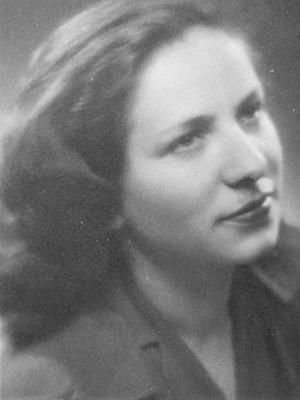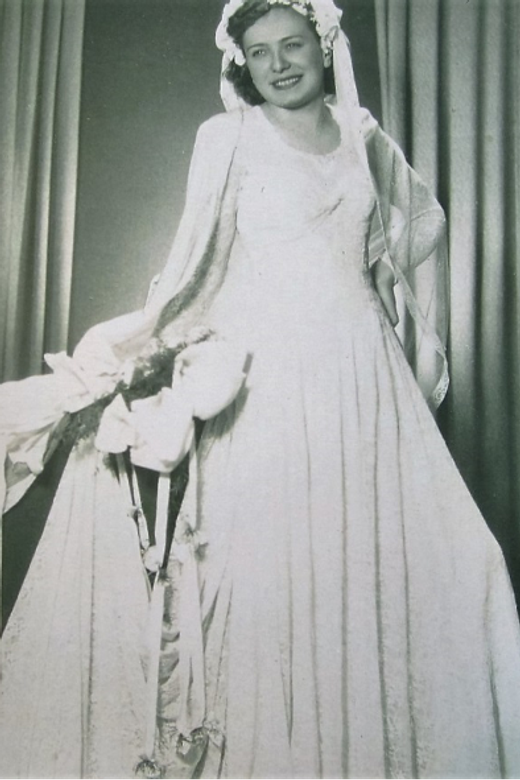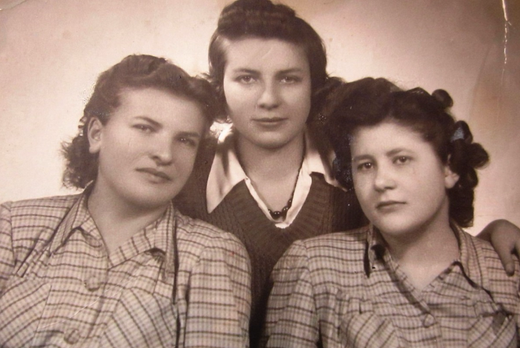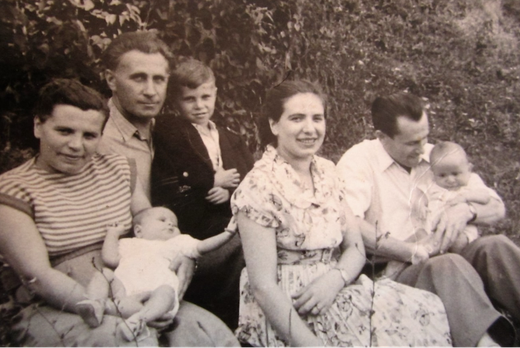Mary Sermer (née Jakubovič)

Born: Starina, Czechoslovakia (now Slovakia), 1929
Wartime experience: Ghettos and camps
Writing Partner: Frances McKeague
Mary Sermer (née Jakubovič) was born in the small farming village of Starina, Czechoslovakia (now Slovakia), in 1929. In 1939, her village came under the control of Hungary, and in the spring of 1944, Mary and her family were sent to the Užhorod ghetto.
Mary was deported to Auschwitz-Birkenau with her two sisters and their parents, who were murdered after their arrival. In late 1944, Mary and her sisters were sent on a transport to Frankfurt. They were then sent to the Ravensbrück concentration camp and subcamp of Rechlin, enduring horrid conditions. Mary and her sisters were liberated from a death march in early 1945. After the war, Mary lived and worked in various places in Slovakia and Czechoslovakia. In 1950, she married Viktor Sermer and they immigrated to Canada in 1968, after the Soviet invasion of Czechoslovakia. Mary and her family settled in Toronto, where she earned a certificate in bookkeeping and worked in accounting. Mary lives in Toronto, surrounded by a close-knit family.
I did not experience any antisemitism until the war started. Even after the war began, I remained friends with all my non-Jewish friends, and they did not turn against us after the occupation.
Losing Everything
I had a very happy childhood before 1939 and I do not have any bad memories of our village. We all lived in peace in Starina and got along very well. I had many Ruthenian Christian friends. When they celebrated Orthodox Christmas, I would join them. Their parents always put straw on the floor and hid candies, and I had such fun with my friends looking for these Christmas treats. I walked to school, never feeling any danger nor having any trouble. No one ever bothered us and the Jewish people lived in peace, observing their own traditions and religion. I did not experience any antisemitism until the war started. Even after the war began, I remained friends with all my non-Jewish friends, and they did not turn against us after the occupation.
Trouble for the Jews started in March 1939, when we were occupied by the Hungarians. They marched into our village and filled it up with their tanks and guns. It was very scary. I recall that we were so afraid of the soldiers because most of us, including the Ruthenians, were unable speak their language, but my mother could speak Hungarian and the soldiers would often come to her for translation.
The schools were eventually all closed to Jewish children. I had started school at age seven, in 1936, but only got to about Grade 4 when I was informed that I could no longer go. I remember the day very well. My sister Charlotte had finished school by that time, so my sister Helen and I were the only Jewish children in a school of about seventy students. The teacher didn’t want to send me home, but he had to follow the law. He tried to explain to me that it was not our fault, but that it was now the law that some children were not allowed to attend school. It was very hard for me to understand. The other children asked why I was being sent home and were told it was only because I was Jewish. They didn’t understand either and would come to my house and ask that I return with them. It was so hard to explain. I was very frustrated for so many reasons, some of them not so serious. Every holiday and for bar and bat mitzvahs, my mother’s four sisters would send money and nice clothing from the United States. I received beautiful pink dresses with ruffles from them, and my mother always dressed me so nicely to go school, and then I could not even go. But this denial marked the first time I felt discriminated against for being Jewish. Previously, a boy had once called out to me, “You Jew.” I was upset and went home to tell my mother, but she had simply explained that yes, I was a Jew.
I felt even worse because I could no longer play with my classmates — no more sewing doll clothes with them or making garlands from the daisies because they were all in class. There were no other Jewish children in the village, so there was no one to play with. I was so lonely that one day I went back to school. The teacher said, “Marienka, why did you come to school? I told you that you cannot come back.” I started to cry and the children were hugging me. I was still crying when I got home, and my mother tried to calm me down by saying, “Don’t worry, a time will come when you will be able to return to school.”
***
Then one day in April 1944, we lost everything — our home and the farm. The soldiers and police came and ordered us out. I remember my mother had just returned from milking the cows and opened the door to them. We were all so scared. They told us we could take only thirty kilograms of goods, and we were to leave immediately. My mother took food, dried beans and some clothes. My father, mother, older sister Helen and I all had to leave. Our closest neighbour came running out of her house and demanded that the soldiers not take us away. She screamed at them, “They are our people! Where are you taking them?” The soldiers ignored her. The police ordered the people of our village to give them their wagons and carriages for use in transporting all the Jews to the ghetto in Užhorod, Hungary, but none of our neighbours were antisemitic, and they would not assist them. Our neighbours were our friends and did not betray us; we had no enemies in the village. Only one farmer gave his wagon and horses to transport Jews out of the town, and as his was the only wagon available, the soldiers had to come back several times. We were on the last wagon leaving for the ghetto. The Hungarian woman who was living in our house actually offered to bake us bread for the trip, but Passover was not yet finished and therefore we couldn’t eat it, so my mother politely declined.
It took three days to get to the Užhorod ghetto. I was only fourteen years old and so afraid because I didn’t know what was happening to us.

Mary on her wedding day. Bratislava, Czechoslovakia (now Slovakia), 1950.

Mary (centre) with her sister Helen (left) and her cousin Helen (right). Prague, Czechoslovakia (now Czech Republic), 1946.

Mary (second from the right) with family. Left to right: Mary’s sister Charlotte holding her daughter, Mila; Charlotte’s husband, Jacob, and their son, Peter; Mary; and Mary’s husband, Viktor, holding their daughter, Dasha. Bratislava, 1952.
Arrival at Auschwitz
When the doors of the car were opened, many people just collapsed. Some died. Those who only fainted were shot immediately. This was the first thing we saw as we left the train. My father had previously told us that if we were allowed to keep what little we had brought, we might be all right, but if we were ordered to leave everything, it would not be good. We were ordered to leave everything, so we were expecting the worst. My mother managed to save a winter coat and put it on me. It was early May. I said it was warm out and asked why I needed a heavy coat. She responded that the coat might be something I would need. By doing this, my mother saved my life. I was so thin I would surely have been sent to the left line for the gas chambers, but that coat hid my thinness and made me look bigger.
As we got off the train, I lost sight of my father. I never saw him again. There were so many trains and so many people that it was impossible to stay together. The soldiers marched us a very short distance. It was at that point that the selection was conducted. The strong, young people were sent to line up on the right. Children who were alone, mothers with children, and the sick and elderly were told to go to the left. Many were screaming and crying, particularly the mothers whose children had been taken from them and sent to the left line. My sisters were with me, and we were desperately holding on to each other. I saw my mother for the last time as she stood in the left line holding on to a couple of small children. I screamed to her, “Mami, Mami!” She turned toward us, and the last thing she said to us was, “Go, my children, and wherever I go, I will pray for you.” I have thought about those last words all my life and feel my mother did look after us, and we did therefore survive.
When we arrived at the first building, we were ordered to strip and then taken to a shower for cleaning and delousing. My sisters and I didn’t have lice, but everyone was treated the same and we were all put through the procedure. Although there hadn’t been much water in the ghetto, we had had enough and made sure we kept ourselves clean. While we were being marched to the showers, we went by a large garbage pile, the belongings of people from the trains. If the Germans decided they didn’t need or want something, they just threw it on this garbage pile and set it on fire. A little girl, maybe about three years old, noticed a small doll among the burning garbage. She let go of the person holding her hand and ran to get the doll. When she picked it up, the Schutzstaffel (SS) guard just picked her up and threw her on the fire to burn to death. It was the first cruelty of this sort that I witnessed at Auschwitz-Birkenau. I just couldn’t believe something like this could happen or was even possible.
None of us being marched off to the showers knew if we would be receiving water or gas. The German guards decided whether we lived or died. My parents might have known because of the stories they’d heard from the people fleeing through the villages, but I was just a kid in 1944 and didn’t have any idea what was happening.
It was the middle of May when we arrived at Auschwitz-Birkenau, and nobody knew that Charlotte, Helen and I were sisters, as we were identified only by numbers on our clothing. I am sure if our relationship had been known, we’d have been separated and potentially sent to the gas chamber. Instead, I was placed in Barrack C along with my two sisters and stayed there for about four months.
There was not much for us to do in Auschwitz. We were not required to work, but neither were we given much to eat, just awful watery soup. In the morning, we were given only a little bit of black coffee. We needed more to drink but never got any water. I had a close girlfriend in the camp who soon got sick and died. I heard that she had been drinking the rusty poisoned water from the tap. At lunch, we had the soup and a bit of bread, some of which we saved for the evening meal. We were given that watery soup for lunch and dinner every day. I shouldn’t really call it soup, though; it was just liquid. But we ate it because there was nothing else. There was so much starvation and sickness. We were not given any water to wash ourselves either, so if it rained we all ran outside to try to wash in the drops as they fell to the ground.
Sometimes I would sneak out to the kitchen where the food was prepared and search through the empty pots and garbage for bits of vegetables, so we might have a few potato peels or something. If I had been caught, the SS guards would have beaten me. But I was never caught. Other than going off to the kitchen in search of food scraps, I was generally well behaved. I knew what would happen if I was not. It would be death.
The red-haired woman in charge of our barracks was evil, a regular devil. She would run around the barracks, beating people with a switch. She was an angry woman and very hard on us all. She was Jewish too, from Slovakia, but I guess she did what she had to in order to survive. Jews are just like everyone else.
When I overheard her speaking Slovak, I asked her in our language if she knew what had happened to my parents. I begged her to tell me. I had been in Auschwitz for about two weeks and didn’t know where they had gone. She looked at me, grabbed my arm, causing it to bruise, and showed me the chimney with smoke coming out. She said, “Your parents are there, coming out in smoke,” and she told me I would soon be joining them. After she said this, I couldn’t speak at all. My sisters kept talking to me, trying to find out what was wrong, but I remained silent, too shocked to speak. This went on for about ten days. For ten days, I didn’t want to live because my mother and father were dead. I just wanted to die too, but then I remembered my mother’s last words and knew she was watching over me, making sure I lived, and I finally spoke. I told my sisters what had happened, and that I knew our parents were dead.
Every day at three o’clock in the morning, we were herded outside to stand in long lines for roll call. It was late August, so it was cold at that hour, and as we didn’t have much to wear and only wooden shoes, we felt that cold. At each roll call, the guards made selections of the sick and weak for the gas chamber. There was a constant smell of burning flesh in the air. One day, by sheer chance, my sisters and I saw our brother Henry. He also saw us, and he screamed out our names before we lost sight of him, never to see him again. We learned later that he and his family all died in that camp.
There were electric fences all around the barracks and we couldn’t go anywhere. After we had been there about three months, Helen became so depressed that she just wanted to throw herself on the electric wires. She felt she had nothing to live for and said we would all die anyway. We had to keep a close watch on her, otherwise she may have done it. It seemed that almost every day people flung themselves onto the fence.
One day, the guards screamed at us to get out of the barracks and line up for counting. An officer came to do the selections, and a large X was placed on the naked backs of those headed for the gas chamber. Those who weren’t going to the gas chamber were to be sent to Frankfurt to work on the airport. I was told I was so skinny I was of no use, and I was selected. Those of us chosen were then marched to another barracks and the doors were locked. I was waiting with the other naked girls to be sent to the gas chamber. Many were screaming and crying. I asked myself, What am I doing here? In the midst of the chaos, I happened to look up and see a small window. Somehow, I climbed up to that window, broke the glass with my bare hands and jumped out. I knew that my sisters and the rest of the women were near the kitchen, so I ran there, put on a smock and waited with them to be transported to Frankfurt. I don’t know if I was courageous or not. I risked being shot, but that would have been a better death than the gas chamber.
My sisters were so happy to see me. The three of us jumped around in jubilation. Unfortunately, the gas chamber count was now incorrect, and the girl at the end of the line outside the kitchen was then selected to die. I have lived with the guilt of this my entire life. If not for me, perhaps that girl would have lived. This stays with me to this day.

